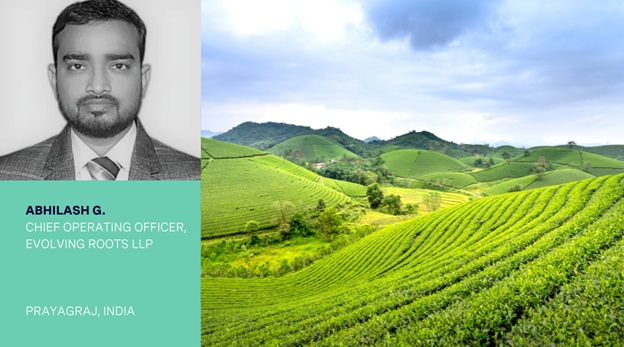What are the various issues relating to the agricultural value chain in South Asia, as well as the challenges faced by agricultural producers? How can these issues be solved?
Abhilash G.
Chief Operating Officer, Evolving Roots LLP
Prayagraj, India
“The current agricultural value-chain is centered around the development of sustainable food, fiber, feed and fuel through raw inputs from various sourcing systems. The global value chains (GVC) are connected to producers and processors to deliver affordable food and goods along with better choices to consumers, helping to generate sustainable income for farmers and processors. Various structural issues affect the value chain and among them are global trade policies, tariffs on imports, foreign direct investment (FDI), commodities market inflation, as well as non-trade policy barriers such as transport infrastructure, supply chains, quality agri-inputs, advanced technology adaptation, and agricultural R&D.
Meanwhile, taking a closer look at Southeast Asia, it is noteworthy that one-third of the population is still employed in agriculture while agricultural productivity and per capita income remain low. This is related to factors such as small land holding, biotic and abiotic factors, poverty, limited market access, the lack of modern technology and technical knowledge, gender and social inclusion, the credit system, agricultural insurance, climate change, and the quality of agri-inputs.
However, various solutions can mitigate these challenges, such as climate-smart interventions, which are suitable to the local agricultural system and community’s needs. These include water-smart practices, such as rainwater harvesting, laser land leveling and micro-irrigation, raised-bed planting, as well as change to crop establishment methods. Others are weather-smart solutions such as ICT-based agro-advisories, index-based insurance, stress-tolerant crop varieties. Some nutrient-smart practices include site-specific nutrient management, precision fertilizers, residue management and catch-cropping systems.
Meanwhile, carbon and energy smart practices can also be useful, such as agroforestry, conservation tillage, residue management and livestock management. Knowledge-smart activities such as crop diversification, farmer-farmer learning, capacity enhancement on climate-smart agriculture, community and cooperatives, market information and off-farm risk management, are also of high importance. One other solution is private-sector engagement in inputs, services and agricultural finance. This can be done through forming dynamic associations between agricultural intensification and territorial expansion, encouraging farmer-friendly companies, focusing on the rice economy more, and promoting export-based cropping systems.”

